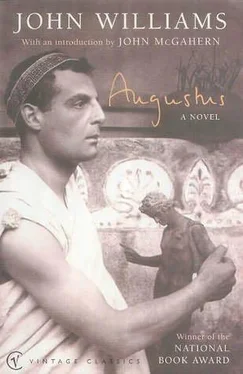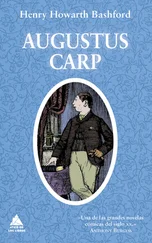John Williams - Augustus
Здесь есть возможность читать онлайн «John Williams - Augustus» весь текст электронной книги совершенно бесплатно (целиком полную версию без сокращений). В некоторых случаях можно слушать аудио, скачать через торрент в формате fb2 и присутствует краткое содержание. Жанр: Историческая проза, на английском языке. Описание произведения, (предисловие) а так же отзывы посетителей доступны на портале библиотеки ЛибКат.
- Название:Augustus
- Автор:
- Жанр:
- Год:неизвестен
- ISBN:нет данных
- Рейтинг книги:3 / 5. Голосов: 1
-
Избранное:Добавить в избранное
- Отзывы:
-
Ваша оценка:
- 60
- 1
- 2
- 3
- 4
- 5
Augustus: краткое содержание, описание и аннотация
Предлагаем к чтению аннотацию, описание, краткое содержание или предисловие (зависит от того, что написал сам автор книги «Augustus»). Если вы не нашли необходимую информацию о книге — напишите в комментариях, мы постараемся отыскать её.
Augustus — читать онлайн бесплатно полную книгу (весь текст) целиком
Ниже представлен текст книги, разбитый по страницам. Система сохранения места последней прочитанной страницы, позволяет с удобством читать онлайн бесплатно книгу «Augustus», без необходимости каждый раз заново искать на чём Вы остановились. Поставьте закладку, и сможете в любой момент перейти на страницу, на которой закончили чтение.
Интервал:
Закладка:
Your mother sends her love to you. She will not write until you have received the message from the Emperor. Though she does not say so, I have good reason to believe that she supports me in this most urgent advice that I have given you.
VII. Letter: Nicolaus of Damascus to Strabo of Amasia (7 B. c.)
For the past fourteen years, I have been content to live in Rome, first in the service of Herod and Octavius Caesar, and then in the service and friendship of Octavius Caesar alone; as you may have inferred from my letters, I had begun to think of this city as my home. I have broken most of my ties abroad; and since the deaths of my parents, I have felt no desire or necessity to return to the land of my birth.
But in a few days I shall be entering my fifty-seventh year; and during the last few months-perhaps it is longer-I have come to feel less and less that this is my homeland. I have come to feel that I am a stranger in this city that has been so kind to me, and in which I have been on the most intimate terms with some of the greatest men of our time.
Perhaps I am mistaken, but there seems to me an air of ugly unrest in Rome; it is not that uncertain restlessness that you must have known in the early days of Octavius Caesar's power, nor the restless excitement that infected me when I first came here fourteen years ago.
Octavius Caesar has brought peace to this land; not since Actium has Roman raised sword against Roman. He has brought prosperity to the city and the countryside; not even the poorest of the people wants for food in the city, and those in the provinces prosper from the beneficences of Rome and Octavius Caesar. Octavius Caesar has brought liberty to the people; no longer need the slave live in fear of the arbitrary cruelty of his master, nor the poor man fear the venality of the rich, nor the responsible speaker fear the consequences of his words.
And yet there is an ugliness in the air which, I fear, bodes ill for the future of the city, the Empire, and the reign of Octavius Caesar himself. Faction is ranged against faction; rumors abound; and no one seems content to live in the comfort and dignity which their Emperor has made possible. These are extraordinary people… It is as if they cannot endure safety and peace and comfort.
So I shall leave Rome, this city that has been my home for so many rich years. I shall return to Damascus, and live out the days that remain to me among my books and whatever words I may write. I shall leave Rome in sorrow and love-without anger or recrimination or disappointment. And I realize as I write these words that I really am saying that I shall leave my friend, Octavius Caesar, with these feelings within me. For Octavius Caesar is Rome; and that, perhaps, is the tragedy of his life.
Oh, Strabo, if the truth were known, I feel that his life is over; in these past few years he has endured more than any man ought to endure. His face has upon it the inhuman composure of one who knows his life is over, and who waits only upon the decay of the flesh which signifies that end.
I have never known a man to whom friendship meant so much; and I mean a friendship of a particular kind. His true friends were those whom he knew when he was young, before he gained the power that he now has. I suppose that one with power can trust only those whom he knew and could trust before he had power; or it may be something else… And now he is alone. He has no one.
Five years ago his friend, Marcus Agrippa, whom he had made his son-in-law, died in the loneliness of his return to Italy from a foreign land; and Octavius Caesar could not even bid him farewell. The year following, that good lady, his sister Octavia, died in the bitter isolation she had chosen away from the city and her brother, on a simple farm at Velletri. And now the last of his old friends, Maecenas, is dead; and Octavius Caesar is alone. No one from his youth remains alive, and therefore there is no one whom he feels that he can trust, no one to whom he can talk about those things that are nearest to him.
I saw the Emperor the week after Maecenas died; I had been in the country during the unhappy event, and I hurried back as soon as I learned of it. I tried to offer him my condolences.
He looked at me with those clear blue eyes that are so startlingly young in his lined face. There was a little smile on his lips.
"Well, our comedy is almost over," he said. "But there can be much sadness in a comedy."
I did not know what to say. "Maecenas," I began. "Maecenas-"
"Did you know him well?" Octavius asked.
"I knew him," I said, "but I do not think I knew him well."
"Few people knew him well," he said. "Not many liked him. But there was a time when we were young-Marcus Agrippa was young, too-there was a time when we were friends, and knew that we would be friends for as long as we lived. Agrippa; Maecenas; myself; Salvidienus Rufus. Salvidienus is dead too, but he died long ago. Perhaps we all died then, when we were young."
I became alarmed, for I had never heard my friend talk disconnectedly before. I said: "You are distraught. It is a heavy loss."
He said: "I was with him when he died. And our friend Horace was there. He died very quietly; he was conscious until the end. We talked about the old times together. He asked me to look out for Horace's welfare; he said that poets had more important things to do than to care for themselves. I believe Horace sobbed and turned away Then Maecenas said that he was tired. And he died."
"Perhaps he was tired."
He said: "Yes, he was tired."
There was a silence between us. And then Octavius said:
"And there will be another soon. Another who is tired."
"My friend-" I said.
He shook his head, still smiling. "I do not mean myself; the gods will not be so kind. It is Horace. I saw the look on his face afterward. Vergil, and then Maecenas, Horace said. He reminded me later that once, many years ago, in a poem-he was making a little fun of one of Maecenas's illnesses-and in the poem he said to Maecenas-can I remember it?-On the same day shall the earth be heaped upon us both. I make the soldier's vow-you lead, and we shall go together, both ready to slog the road that ends all roads, inseparable friends.’… I don't think that Horace will outlive him by many months. He does not wish to."
"Horace," I said.
"Maecenas wrote badly," Octavius said. "I always told him that he wrote badly."
… I could not comfort him. Two months later Horace was dead. He was discovered one morning by his servant, in his little house above the Digentia. His face was quiet, as if he were simply asleep. Octavius had his ashes interred beside those of Maecenas, at the farther end of the Esquiline hill.
The only one alive now whom he loves is his daughter. And I fear for that love; I fear most desperately. For his daughter seems to grow more careless of her position month by month; her husband will not live with her, but remains abroad, though he is consul for the year.
I do not believe that Rome can endure the death of Octavius Caesar, and I do not believe that Octavius Caesar can endure the death of his soul.
VIII. The Journal of Julia, Pandateria (A.D. 4)
The way of life that I had in Rome, then, was a way of almost utter freedom. Tiberius was abroad, spending even the year of his consulship in Germany, organizing the outposts there against the encroachments of the barbarian tribes. Upon the few occasions that he had to return to Rome, he made a ritual visit, and quickly found business elsewhere.
The year after his consulship, my father, upon his own initiative, ordered a replacement for him on the German frontier, and ordered my husband to return to his duties in Rome. And Tiberius refused. It was, I thought, the most admirable thing he had ever done; and I almost respected him for his courage.
Читать дальшеИнтервал:
Закладка:
Похожие книги на «Augustus»
Представляем Вашему вниманию похожие книги на «Augustus» списком для выбора. Мы отобрали схожую по названию и смыслу литературу в надежде предоставить читателям больше вариантов отыскать новые, интересные, ещё непрочитанные произведения.
Обсуждение, отзывы о книге «Augustus» и просто собственные мнения читателей. Оставьте ваши комментарии, напишите, что Вы думаете о произведении, его смысле или главных героях. Укажите что конкретно понравилось, а что нет, и почему Вы так считаете.











